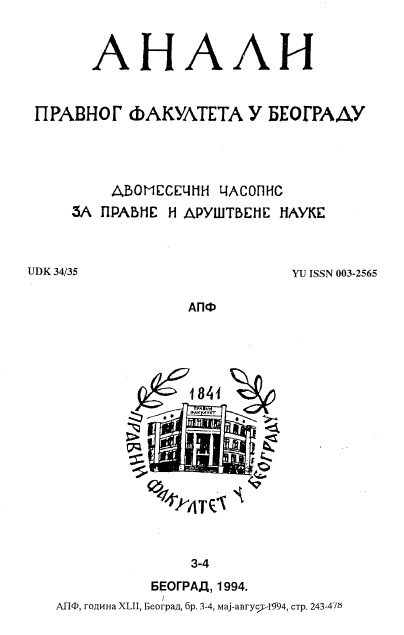СЕЦЕСИОНИСТИЧКО САМООПРЕДЕЉЕЊЕ: СЛУЧАЈЕВИ СЛОВЕНИЈЕ И ХРВАТСКЕ
SECESSIONIST SELF-DETERMINATION THE CASES OF SLOVENIA AND CROATIA
Author(s): Peter RadanSubject(s): Law, Constitution, Jurisprudence, Transformation Period (1990 - 2010)
Published by: Правни факултет Универзитета у Београду
Keywords: Secession; Territorial integrity; Recognition of states; Self-determination; Yugoslavia
Summary/Abstract: The secession of Slovenia and Croatia, and their recognition as international states has had a significant impact on the principles of self-determination. It was on the basis of self-determination that both republics justified secession, and this argument found favour wiht the international community. The recognition of Slovenia and Croatia means that self-determination can manifest itself by the act of secession from an internationally recognised state. This is a dramatic departure from previous international practice. At the time of the drafting of the United Nations Charter and its provisions on self-determination, concerns were expressed, especially by the French, that these articles could lead to secessionist claims (113). This has now occurred. As a consequence there is now an emerging international law on secession. The EC guidelines upon which the aspirations of the secessionist Yugoslav republics were assessed, are important constituents in this new law on secession. As Musgrave has observed: "The response of the international community to the events in Yugoslavia has done much to weaken the principle of territorial integrity and to encourage the notion that self-determination can be achieved through secession from an independent and sovereign state ... A precedent has thus been established whereby a separate state can be unilaterally created by a constituent unit of an existing sovereign state, and will be recognised as such by the international community even though it has not fulfilled the traditional legal criteria for statehood" (114). On a political level the EC decision to recognise Slovenia and Croatia was based on the false premise that it would end the carnage and bloodshed in Yugoslavia. Indeed, the result has been the opposite. The decision was made at the result of German pressure within the EC, and masked political divisions over the wisdom of recognition, whilst at the same time it severely strained the EC’s crisis management capacity (115). Recognition of the rebel Yugoslav republics, or "wreckognition" (116) as The Economist labelled it, was, in the words of Eyal, "a shameful game that failed both to preserve the Community’s reputation, or prevent the war from widening" (117). The political ramifications have been that the international community now has dramatically limited options available for reaching a speedy and equitable solution to the problems of former Yugoslavia.
Journal: Анали Правног факултета у Београду
- Issue Year: 42/1994
- Issue No: 3-4
- Page Range: 262-281
- Page Count: 20
- Language: Serbian

